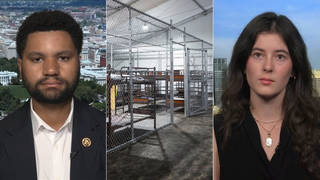
Topics
Guests
- Jim Shultzexecutive director of the Democracy Center in Cochabamba, Bolivia. He writes a blog on Bolivia that can be found at Democracyctr.org. He joins us on the line from Cochabamba.
In Bolivia, President Evo Morales has rejected an autonomy vote by the country’s richest region of Santa Cruz, calling the poll “illegal and unconstitutional.” The proposals voted on Sunday include giving Santa Cruz more control over land distribution and rich oil and gas reserves. [includes rush transcript]
Transcript
AMY GOODMAN: In Bolivia, President Evo Morales has rejected an autonomy vote by the country’s richest region of Santa Cruz. He called the poll “illegal and unconstitutional.” The proposals voted on Sunday included giving Santa Cruz more control over land distribution and rich oil and gas reserves.
An official partial count of the vote showed 82 percent of the voters backed the autonomy plans. The result had been widely expected, as backers of Morales vowed to boycott the referendum.
Thousands turned out in the streets of Santa Cruz Monday to celebrate the results and the region’s governor, Ruben Costas, called the result “the most important act of our republican history.” But in a national address after voting had finished, President Morales said he would ignore the results. He stressed the high levels of abstention and called for opposition state governors to engage in dialogue with the central government.
The Santa Cruz region sits atop natural gas fields that are vital to Bolivia’s economy. It also has the country’s biggest farming properties, concentrated in the hands of just a few families, several of which helped organize the referendum.
Next month, three other opposition-run provinces in Bolivia’s eastern lowlands hold their own autonomy referendums.
We now go to Bolivia to speak with Jim Shultz. He is the executive director of the Democracy Center in Cochabamba, joining us on the phone. Welcome to Democracy Now!, Jim.
JIM SHULTZ: Good morning, Amy. How are you?
AMY GOODMAN: Good. Can you talk about the significance of this vote in oil-rich Santa Cruz, the wealthiest region of Bolivia?
JIM SHULTZ: Well, Amy, I think your listeners have a pretty sophisticated understanding of what’s been going on in Bolivia for the last few years, and this vote is part of the package of this period of social and political transformation in the country. Santa Cruz is a bastion of anti-Evo sentiment, and it has been for quite some time. And so, this is the latest move led by an elite in Santa Cruz to try to separate itself from what the national government under Morales has been trying to do.
What it means in practical terms is very difficult to say. Really, it’s a stalemate. I think in terms of the two big issues, land reform and gas and oil, I think it means this. On land reform, I think it means that whatever efforts the government has under way in Santa Cruz are completely stalled. I don’t see how the Morales government can do anything in terms of land reform in Santa Cruz without sending in the army, and the Morales government is not going to do that. In terms of gas and oil, I think the stalemate works in the other direction, that the big buyers of Bolivian gas and oil are Brazil and Argentina. Those are both left-leaning governments that are sympathetic to Morales. They’re not going to cut side deals with the regional government in Santa Cruz. And so, the monies will continue to flow through the central government, and if Santa Cruz and other regions in that part of the country are going to get a higher cut, it’s going to have to be through a negotiation with Morales and the people in La Paz.
AMY GOODMAN: Who is behind the people of Santa Cruz?
JIM SHULTZ: Well, Santa Cruz is a region of the country that’s — you know, it’s much whiter, it’s much less indigenous, it’s more affluent, and there is this network of wealthy landowners that really drive the politics of the region. A number of them come from the families of Croatian immigrants that came here during the period and afterwards of World War II, and there is a real power base. And so, you have a very small number of families. You know, it looks like Central America. It looks like Salvador, where you have a very small number of families controlling a vast tract of land. And they really were the driving force.
Now, they have succeeded in building a much more popular base against Morales and in favor of economy than just the elite. I was in Santa Cruz a couple of months ago during one of the general strikes, and from both a taxi driver and a woman who sold gum in the street, I heard the same basic line that you hear from the elite in Santa Cruz, which is, you know, we work hard, and we don’t want our money sent to a cause in the national government, and we want autonomy. So they’ve succeeded in building not just the base of the elite, but a base that extends into, you know, certainly the middle class and, I think, segments of low-income people in the Santa Cruz region, as well.
AMY GOODMAN: And Jim, finally, the role of the United States, is it playing any in Bolivia right now?
JIM SHULTZ: Well, whatever the United States is doing to monkey with this, it’s doing behind the scenes. And I — you know, I wouldn’t put it past the US embassy here to have been giving certainly tacit support for some of this. But this is homegrown. You know, this is really — these are the people who institutionally, these are the people who economically and politically and socially don’t like Evo, don’t like what he stands for, don’t like the idea of indigenous power being built in the country. And what they have done — and this is key — they have managed to turn regional interest into the engine that can stop what Morales and the MAS party are trying to do. And that’s homegrown. I think it’s a mistake to declare that it’s something that the United States created.
AMY GOODMAN: Jim Shultz, I want to thank you very much for being with us, executive director of the Democracy Center in Cochabamba, Bolivia. He blogs at democracyctr.org.













Media Options